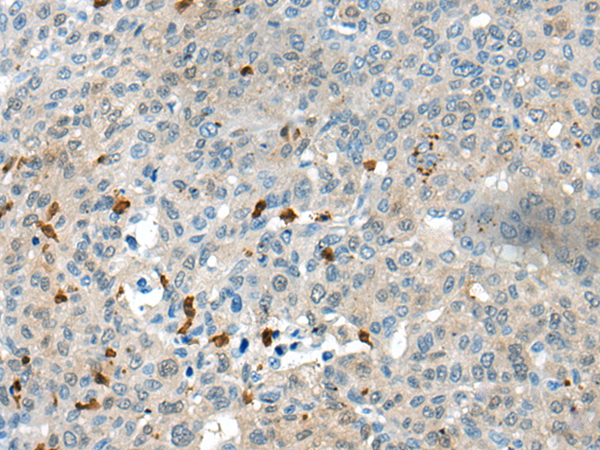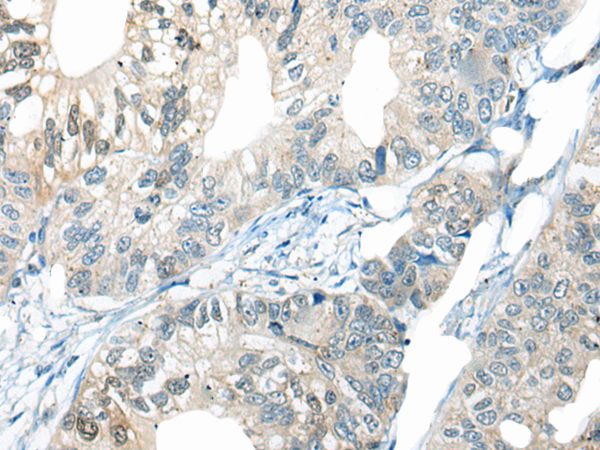

| WB | 咨询技术 | Human,Mouse,Rat |
| IF | 咨询技术 | Human,Mouse,Rat |
| IHC | 1/20-1/100 | Human,Mouse,Rat |
| ICC | 技术咨询 | Human,Mouse,Rat |
| FCM | 咨询技术 | Human,Mouse,Rat |
| Elisa | 1/5000-1/10000 | Human,Mouse,Rat |
| Aliases | CELF-4; BRUNOL4 |
| Host/Isotype | Rabbit IgG |
| Antibody Type | Primary antibody |
| Storage | Store at 4°C short term. Aliquot and store at -20°C long term. Avoid freeze/thaw cycles. |
| Species Reactivity | Human, Mouse |
| Immunogen | Synthetic peptide of human CELF4 |
| Formulation | Purified antibody in PBS with 0.05% sodium azide and 50% glycerol. |
+ +
以下是关于CELF4抗体的3篇参考文献及其摘要内容:
---
1. **文献名称**:*CELF4 regulates synaptic and risk gene expression in human neurons*
**作者**:Weyn-Vanhentenryck SM et al.
**摘要**:该研究利用CELF4抗体通过RNA免疫沉淀测序(RIP-Seq)和蛋白质组学分析,揭示了CELF4蛋白在人类神经元中调控突触相关基因及自闭症风险基因的转录后表达机制,表明其异常与神经发育障碍相关。
2. **文献名称**:*RNA-binding protein CELF4 regulates skeletal muscle excitation-contraction coupling by stabilizing CACNA1S transcripts*
**作者**:Kong SW et al.
**摘要**:研究通过CELF4抗体的免疫印迹和免疫荧光实验,发现CELF4通过结合钙离子通道基因CACNA1S的mRNA维持其稳定性,调控骨骼肌兴奋-收缩偶联功能,其缺失可能导致肌无力表型。
3. **文献名称**:*Differential roles of CELF family proteins in TDP-43-mediated neurodegeneration*
**作者**:Bhardwaj A et al.
**摘要**:文章利用CELF4抗体进行免疫共沉淀实验,探讨CELF4与其他CELF家族成员在TDP-43蛋白介导的神经退行性疾病(如ALS)中的差异作用,表明CELF4可能通过调控异常RNA剪接加剧病理进程。
---
以上研究均通过CELF4抗体探究其在不同生理/病理模型中的分子机制,涵盖神经发育、肌肉功能及退行性疾病等领域。
The CELF4 antibody targets the CELF4 protein, a member of the CUGBP Elav-like family (CELF) of RNA-binding proteins. CELF4. also known as BRUNOL4. plays critical roles in post-transcriptional gene regulation, including mRNA splicing, editing, stability, and translation. It is highly expressed in the brain, particularly in neurons, where it influences synaptic plasticity, neuronal development, and function. Dysregulation of CELF4 has been implicated in neurodevelopmental and neurological disorders, such as autism spectrum disorders (ASD), intellectual disability, and epilepsy. Studies also link CELF4 to amyotrophic lateral sclerosis (ALS) due to its interaction with RNA-processing pathways disrupted in neurodegeneration.
CELF4 antibodies are essential tools for investigating its expression, localization, and molecular interactions in both healthy and diseased states. They are widely used in techniques like Western blotting, immunohistochemistry, and immunofluorescence to study protein levels in tissues or cultured cells. Research utilizing CELF4 antibodies has helped uncover its role in modulating ion channel expression and neurotransmitter receptor trafficking, which may underlie seizure susceptibility and cognitive deficits. Additionally, these antibodies aid in exploring CELF4’s involvement in circadian rhythm regulation and stress granule formation, highlighting its multifaceted impact on cellular physiology. By enabling precise detection and functional studies, CELF4 antibodies contribute to advancing our understanding of its pathological mechanisms and potential therapeutic targets.
×